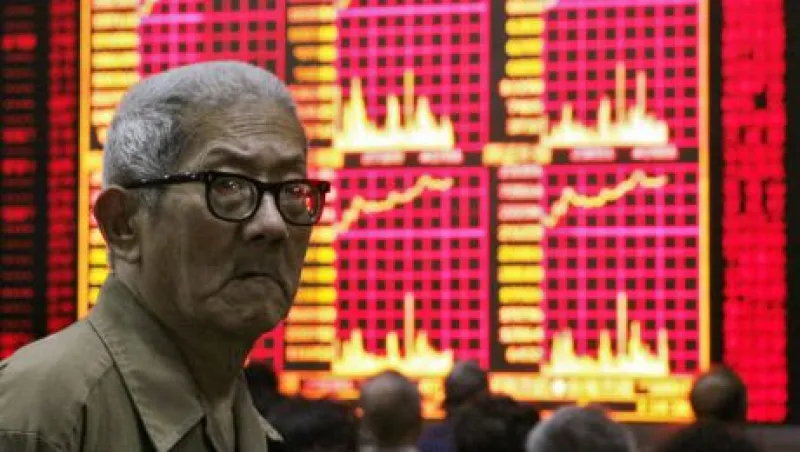Beijing today made it clear that it is prepared to intervene in the Shanghai and Shenzhen Stock Exchanges yet again. An article published today in Communist Party of China mouthpiece People’s Daily reiterated the government’s commitment to financial stability. The editorial, which carried no byline, said that the central government was ready to take action when volatility arises. Separately, the piece brushed aside calls for more transparency and open market reforms. For now, it appears that China’s leadership intends to approach stock markets in the same way that it does bridges and railroads: by decree from above with expectations that its demands be met without concession. Western investors appear unimpressed by this approach. In a report today, Kenneth Chan, Hong Kong–based quantitative strategist for Jefferies, noted that Chinese equity exchange-traded funds were racked up $2.8 billion in net foreign outflows for last week.
Amazon becomes world’s largest retailer. E-commerce giant Amazon has overtaken Wal-Mart to become the world’s largest retailer by market capitalization. Amazon’s shares rose by nearly 20 percent in aftermarket trading following the release of second-quarter 2015 earnings with a 20 percent year-over-year increase of revenues in excess of $23 billion,
Nikkei to buy Financial Times. Salmon-colored financial daily Financial Times is to be acquired by Japanese financial media giant Nikkei for $1.3 billion, according to an announcement yesterday from London–based publisher Pearson, the newspaper’s present owners. In the company’s statement Pearson, which has owned the FT for nearly 60 years, said that Nikkei is better positioned in digital and online media to capture fully the brand’s potential.
WTO slashes IT product tariffs. The World Trade Organization announced today that members have struck an agreement to remove tariffs for information technology products. The deal, which marks a change to the Information Technology Agreement secured 18 years ago, will encompass up to $1 trillion in annual trade flows in the sector.
Anthem-Cigna deal becomes official. Health insurance company Anthem’s plans to acquire sector rival Cigna for $54.2 billion were confirmed yesterday. The deal, coming on the heels of Humana’s sale to Aetna for $37 billion less than a month ago, will create the largest health insurer in the U.S. by membership.
European PMI disappoints. Final Markit July manufacturing purchasing managers index measures for primary euro-zone economies and the euro zone as a whole fell short of flash readings, with French figures again slipping into negative territory at 49.6. The composite reading for the euro zone came in at 53.7, down from an initial read of 54 and lower than June’s final read, as Greek jitters impacted business confidence.
Portfolio Perspective: Curious Case of Corporate Credit Weakness — Jeffrey Meli and Bradley Rogoff, Barclays
The year-to-date underperformance of the U.S. Corporate Credit Index is notable. Spreads were little changed this week through Wednesday, compared with a $0.91 price decline in high yield, but year-to-date, they have widened 18 basis points. The current 149-basis-point spread is the widest since the market sell-off of June 2013.
Commodity-related credit has certainly contributed, with the investment-grade metals sector in particular looking weak at a –3.2 percent excess return for the year. A rapid 4 percent fall in the price of gold this week served as an example of the risks embedded in these credits. Commodities have not only affected just investment-grade credit, though. The effect has been more dramatic in high yield, where metals have returned –8.4 percent and energy has returned –1.1 percent year-to-date, compared with 2.9 percent for the index excluding those sectors. Surprisingly, emerging-markets corporates, which have significantly greater exposure to commodities than U.S. high-yield or investment-grade, have produced a 3.7 percent total return year-to-date. We think supply explains much of the relative underperformance for investment grade, as $758 billion of new issuance for the year through June was a 15 percent increase from 2014, which was itself a record issuance year.
The seasonally slower late summer should hopefully clear up some of the supply pressures. We at Barclays remain optimistic that spreads will tighten through year-end. Seven years removed from the low point of the 2008–’09 financial crisis, the credit cycle now appears well advanced. Current levels of leading indicators such as bank lending standards and the volume of mergers & acquisitions have historically been associated with widening in credit spreads. Should the Federal Reserve enter a monetary tightening cycle later this year, the macro signal would be further strengthened — thus conditions tilt the longer-term risks toward greater spread premium for U.S. credit. What is missing is an immediate catalyst. China and the emerging markets have shown their ability to influence commodity prices, though the influence of China on other sectors is likely to be more idiosyncratic.
Jeffrey Meli and Bradley Rogoff are credit strategists for Barclays in New York.






